SsangYong Korando vs VW T-Cross - Differences and prices compared
Compare performance (190 HP vs 150 HP), boot space and price (27000 £ vs 21400 £ ) at a glance. Find out which car is the better choice for you – SsangYong Korando or VW T-Cross?
Costs and Efficiency:
When it comes to price and running costs, the biggest differences usually appear. This is often where you see which car fits your budget better in the long run.
VW T-Cross has a evident advantage in terms of price – it starts at 21400 £ , while the SsangYong Korando costs 27000 £ . That’s a price difference of around 5597 £.
Fuel consumption also shows a difference: VW T-Cross manages with 5.40 L and is therefore distinct more efficient than the SsangYong Korando with 7.50 L. The difference is about 2.10 L per 100 km.
Engine and Performance:
Power, torque and acceleration say a lot about how a car feels on the road. This is where you see which model delivers more driving dynamics.
When it comes to engine power, the SsangYong Korando has a evident edge – offering 190 HP compared to 150 HP. That’s roughly 40 HP more horsepower.
Both models accelerate almost equally fast – 8.40 s from 0 to 100 km/h.
There’s also a difference in torque: SsangYong Korando pulls distinct stronger with 360 Nm compared to 250 Nm. That’s about 110 Nm difference.
Space and Everyday Use:
Whether family car or daily driver – which one offers more room, flexibility and comfort?
Both vehicles offer seating for 5 people.
In curb weight, VW T-Cross is slightly lighter – 1267 kg compared to 1517 kg. The difference is around 250 kg.
In terms of boot space, the SsangYong Korando offers somewhat more room – 551 L compared to 455 L. That’s a difference of about 96 L.
When it comes to payload, VW T-Cross hardly perceptible takes the win – 480 kg compared to 463 kg. That’s a difference of about 17 kg.
Who comes out on top?
Overall, the SsangYong Korando shows itself to be outperforms in nearly all aspects and secures the title of DriveDuel Champion.
It convinces with the more balanced overall package and proves to be the more versatile choice for everyday use.
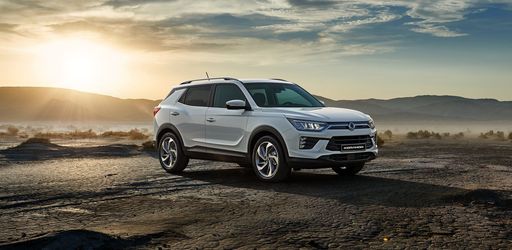
SsangYong Korando
Costs and Consumption
View detailed analysis
Engine and Performance
View detailed analysis
Dimensions and Body
View detailed analysis
SsangYong Korando
The SsangYong Korando pairs bold, modern styling with a surprisingly roomy and practical cabin, so it looks confident at the lights and handles the daily grind without fuss. It swaps flashy badges for honest value, offering a composed ride, useful equipment and wallet-friendly running that make it an appealing pick for buyers who'd rather spend on weekends than on extravagant finance packages.
details
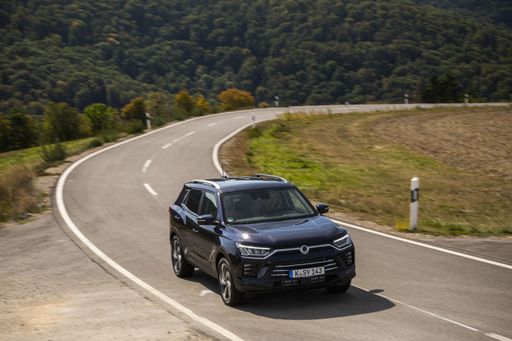
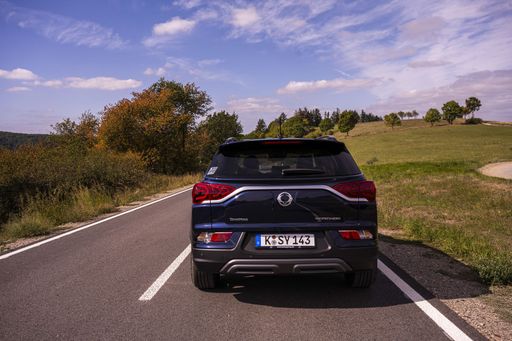
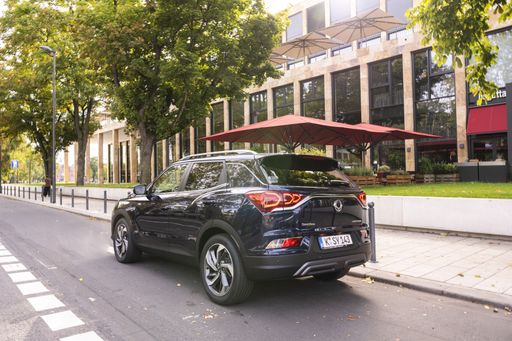
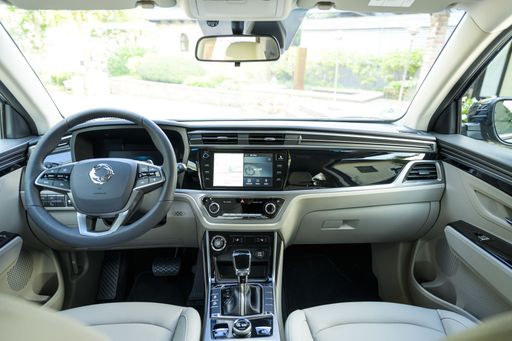
VW T-Cross
The VW T-Cross turns everyday practicality into a style statement, offering a roomy-feeling cabin, clever storage and playful design that suits town life and family duties alike. On the road it's composed and relaxed, rewarding buyers who want the raised seating and confident presence of an SUV without the weighty compromises.
details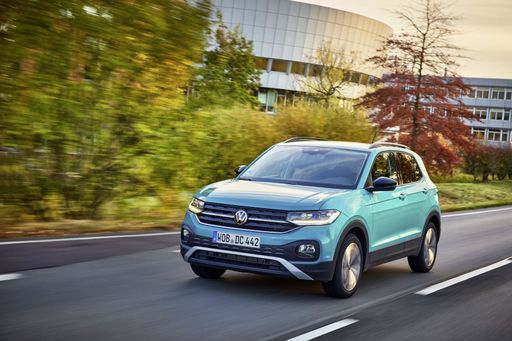
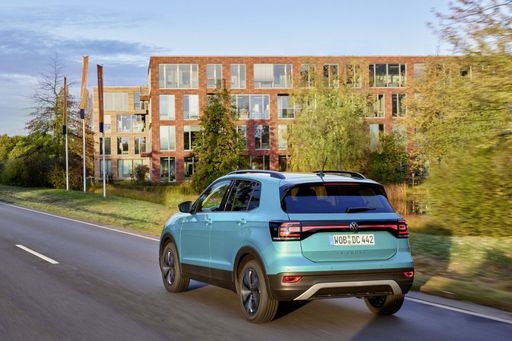
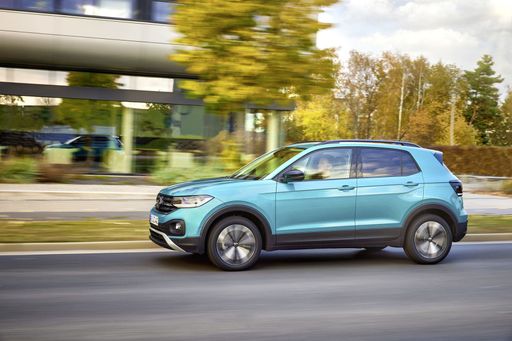
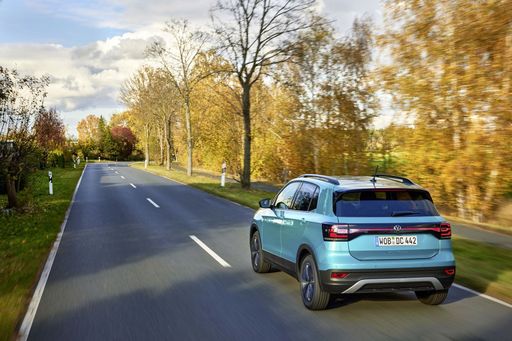
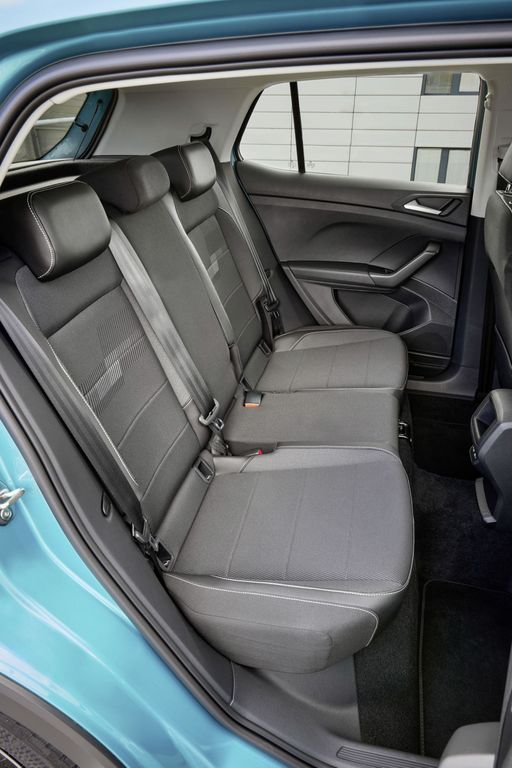
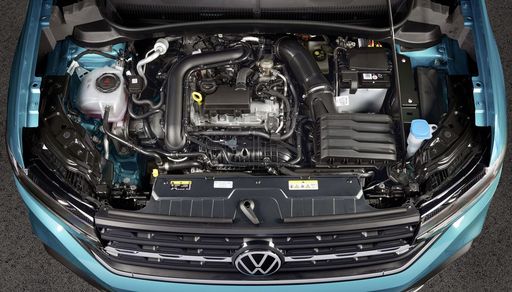
Costs and Consumption |
|
|---|---|
|
Price
27000 - 42000 £
|
Price
21400 - 32000 £
|
|
Consumption L/100km
7.5 - 8.6 L
|
Consumption L/100km
5.4 - 6 L
|
|
Consumption kWh/100km
16.80 kWh
|
Consumption kWh/100km
-
|
|
Electric Range
339 km
|
Electric Range
-
|
|
Battery Capacity
-
|
Battery Capacity
-
|
|
co2
0 - 197 g/km
|
co2
124 - 136 g/km
|
|
Fuel tank capacity
50 L
|
Fuel tank capacity
-
|
Dimensions and Body |
|
|---|---|
|
Body Type
SUV
|
Body Type
SUV
|
|
Seats
5
|
Seats
5
|
|
Doors
5
|
Doors
-
|
|
Curb weight
1517 - 1840 kg
|
Curb weight
1267 - 1338 kg
|
|
Trunk capacity
551 L
|
Trunk capacity
455 L
|
|
Length
4450 - 4465 mm
|
Length
-
|
|
Width
1870 mm
|
Width
1784 mm
|
|
Height
1620 - 1645 mm
|
Height
-
|
|
Max trunk capacity
1248 L
|
Max trunk capacity
-
|
|
Payload
410 - 463 kg
|
Payload
463 - 480 kg
|
Engine and Performance |
|
|---|---|
|
Engine Type
Petrol, Electric
|
Engine Type
Petrol
|
|
Transmission
Manuel, Automatic
|
Transmission
Manuel, Automatic
|
|
Transmission Detail
Manual Gearbox, Automatic Gearbox, Reduction Gearbox
|
Transmission Detail
Manual Gearbox, Dual-Clutch Automatic
|
|
Drive Type
Front-Wheel Drive, All-Wheel Drive
|
Drive Type
Front-Wheel Drive
|
|
Power HP
163 - 190 HP
|
Power HP
95 - 150 HP
|
|
Acceleration 0-100km/h
8.40 s
|
Acceleration 0-100km/h
8.4 - 11.3 s
|
|
Max Speed
156 - 191 km/h
|
Max Speed
-
|
|
Torque
260 - 360 Nm
|
Torque
175 - 250 Nm
|
|
Number of Cylinders
4
|
Number of Cylinders
3 - 4
|
|
Power kW
120 - 140 kW
|
Power kW
70 - 110 kW
|
|
Engine capacity
1497 cm3
|
Engine capacity
999 - 1498 cm3
|
General |
|
|---|---|
|
Model Year
2021 - 2023
|
Model Year
2024 - 2025
|
|
CO2 Efficiency Class
F, G, A
|
CO2 Efficiency Class
D, E
|
|
Brand
SsangYong
|
Brand
VW
|
What drive types are available for the SsangYong Korando?
Available configurations include Front-Wheel Drive or All-Wheel Drive.




